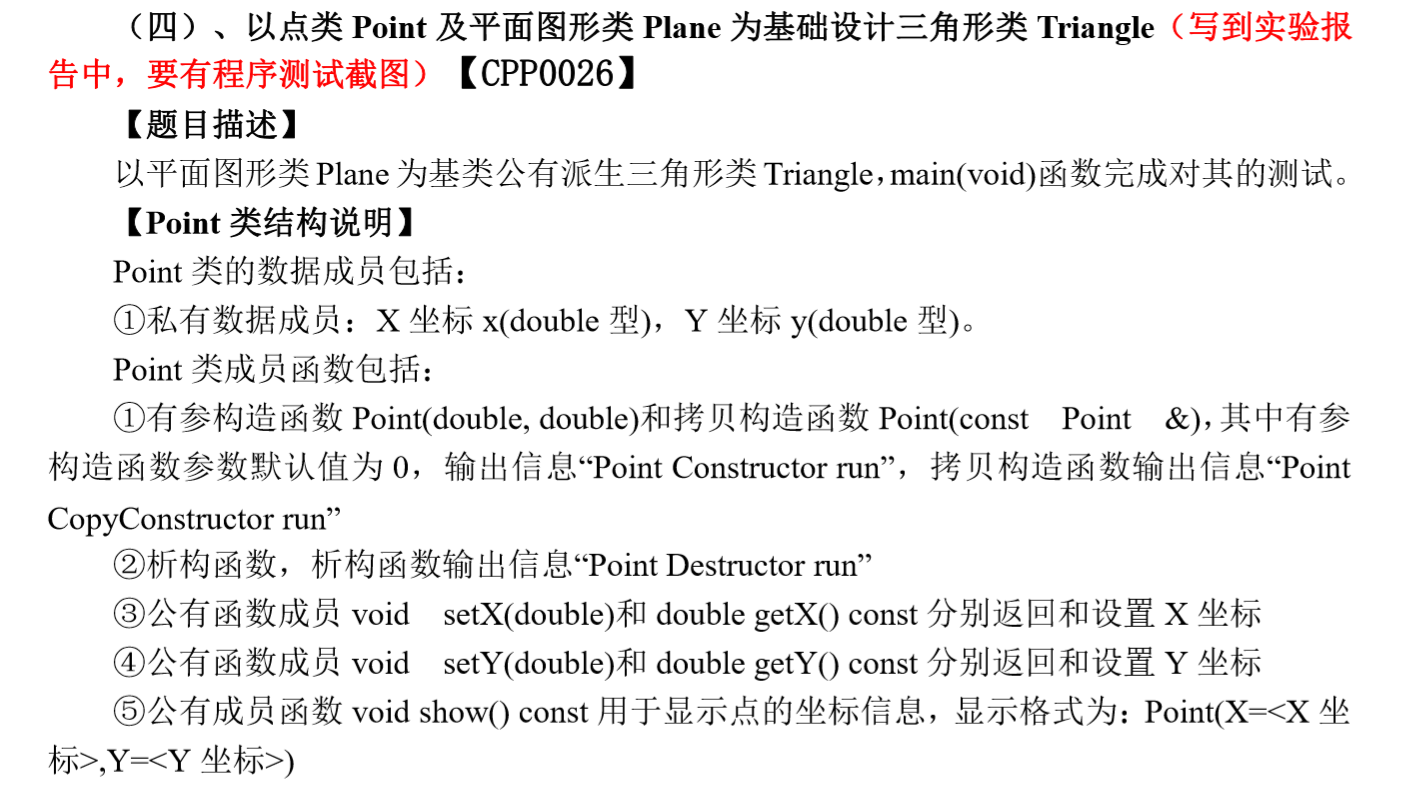1 今天写了以点类设计三角类:
题目要求:



程序源代码:
package Plane;
public class Point {
double x;
double y;
Point()//无参构造
{
x=0;
y=0;
System.out.println("Point Constructor run");
}
Point(double xv,double yv)//有参构造
{
x=xv;
y=yv;
System.out.println("Point Constructor run");
}
Point(Point p) //拷贝构造
{
x=p.x;
y=p.y;
System.out.println("Point CopyConstructor run");
}
void show() //显示Point信息
{
System.out.print("("+x+","+y+")");
}
void setX(double xv){x=xv;} //设置X坐标
void setY(double yv){y=yv;} //设置Y坐标
double getX() {return x;} //获取X坐标
double getY() {return y;} //获取Y坐标
}
double x;
double y;
Point()//无参构造
{
x=0;
y=0;
System.out.println("Point Constructor run");
}
Point(double xv,double yv)//有参构造
{
x=xv;
y=yv;
System.out.println("Point Constructor run");
}
Point(Point p) //拷贝构造
{
x=p.x;
y=p.y;
System.out.println("Point CopyConstructor run");
}
void show() //显示Point信息
{
System.out.print("("+x+","+y+")");
}
void setX(double xv){x=xv;} //设置X坐标
void setY(double yv){y=yv;} //设置Y坐标
double getX() {return x;} //获取X坐标
double getY() {return y;} //获取Y坐标
}
package Plane;
public class Plane extends Point {
Plane(){}
Plane(double xv,double yv){super(xv,yv);}
Plane(Plane p){super(p);}
double length(){return 0;}
double area(){return 0;}
}
Plane(){}
Plane(double xv,double yv){super(xv,yv);}
Plane(Plane p){super(p);}
double length(){return 0;}
double area(){return 0;}
}
package Plane;
public class Triangle extends Plane{
Point a,b,c;
Triangle()
{
a=new Point(0,0);
b=new Point(0,0);
c=new Point(0,0);
System.out.println("Triangle Constructor run");
}
Triangle(Point aa,Point bb,Point cc)
{
a=aa;
b=bb;
c=cc;
System.out.println("Triangle Constructor run");
}
Triangle(Triangle T) //拷贝构造函数
{
a=T.a;
b=T.b;
c=T.c;
System.out.println("Triangle CopyConstructor run");
}
void setA(Point P) //设置A顶点
{
a.setX(P.getX());
a.setY(P.getY());
}
Point getA(){return a;}
void setB(Point P)
{
b.setX(P.getX());
b.setY(P.getY());
}
Point getB(){return b;}
void setC(Point P)
{
c.setX(P.getX());
c.setY(P.getY());
}
Point getC(){ return c; }
void show()
{
System.out.print("Triangle(A=");
a.show();
System.out.print(",B=");
b.show();
System.out.print(",c=");
c.show();
System.out.print(")");
}
double area()
{
double S;
Point p= new Point(a);
double x1=p.getX();
Triangle()
{
a=new Point(0,0);
b=new Point(0,0);
c=new Point(0,0);
System.out.println("Triangle Constructor run");
}
Triangle(Point aa,Point bb,Point cc)
{
a=aa;
b=bb;
c=cc;
System.out.println("Triangle Constructor run");
}
Triangle(Triangle T) //拷贝构造函数
{
a=T.a;
b=T.b;
c=T.c;
System.out.println("Triangle CopyConstructor run");
}
void setA(Point P) //设置A顶点
{
a.setX(P.getX());
a.setY(P.getY());
}
Point getA(){return a;}
void setB(Point P)
{
b.setX(P.getX());
b.setY(P.getY());
}
Point getB(){return b;}
void setC(Point P)
{
c.setX(P.getX());
c.setY(P.getY());
}
Point getC(){ return c; }
void show()
{
System.out.print("Triangle(A=");
a.show();
System.out.print(",B=");
b.show();
System.out.print(",c=");
c.show();
System.out.print(")");
}
double area()
{
double S;
Point p= new Point(a);
double x1=p.getX();
Point q= new Point(a);
double y1=q.getY();
Point m=new Point(b);
double x2=m.getX();
double y1=q.getY();
Point m=new Point(b);
double x2=m.getX();
Point n=new Point(b);
double y2=n.getY();
Point Y=new Point(c);
double x3=Y.getX();
double y2=n.getY();
Point Y=new Point(c);
double x3=Y.getX();
Point J=new Point(c);
double y3=J.getY();
double a1=Math.pow(((x1-x2)*(x1-x2)+(y1-y2)*(y1-y2)),0.5);
double b1=Math.pow(((x1-x3)*(x1-x3)+(y1-y3)*(y1-y3)),0.5);
double c1=Math.pow(((x3-x2)*(x3-x2)+(y3-y2)*(y3-y2)),0.5);
double p1=(a1+b1+c1)*0.5;
S=Math.pow((p1*(p1-a1)*(p1-b1)*(p1-c1)),0.5);
return S;
}
double length()
{
double L;
double x1=a.getX();
Point o=new Point(a);
double y1=o.getY();
Point m=new Point(b);
double x2=m.getX();
Point p=new Point(b);
double y2=p.getY();
Point n=new Point(c);
double x3=n.getX();
Point q=new Point(c);
double y3=q.getY();
L=Math.pow(((x1-x2)*(x1-x2)+(y1-y2)*(y1-y2)),0.5)+Math.pow(((x1-x3)*(x1-x3)+(y1-y3)*(y1-y3)),0.5)+Math.pow(((x3-x2)*(x3-x2)+(y3-y2)*(y3-y2)),0.5);
return L;
}
}
double y3=J.getY();
double a1=Math.pow(((x1-x2)*(x1-x2)+(y1-y2)*(y1-y2)),0.5);
double b1=Math.pow(((x1-x3)*(x1-x3)+(y1-y3)*(y1-y3)),0.5);
double c1=Math.pow(((x3-x2)*(x3-x2)+(y3-y2)*(y3-y2)),0.5);
double p1=(a1+b1+c1)*0.5;
S=Math.pow((p1*(p1-a1)*(p1-b1)*(p1-c1)),0.5);
return S;
}
double length()
{
double L;
double x1=a.getX();
Point o=new Point(a);
double y1=o.getY();
Point m=new Point(b);
double x2=m.getX();
Point p=new Point(b);
double y2=p.getY();
Point n=new Point(c);
double x3=n.getX();
Point q=new Point(c);
double y3=q.getY();
L=Math.pow(((x1-x2)*(x1-x2)+(y1-y2)*(y1-y2)),0.5)+Math.pow(((x1-x3)*(x1-x3)+(y1-y3)*(y1-y3)),0.5)+Math.pow(((x3-x2)*(x3-x2)+(y3-y2)*(y3-y2)),0.5);
return L;
}
}
package Plane;
import java.util.Scanner;
public class Tma extends Triangle{
void length(Triangle p){System.out.println("Length="+p.length());}
void area(Triangle p){System.out.println("Area="+p.area());}
public static void main(String[] args)
{
double x,y;
Point p1=new Point();
Point p2=new Point(1,1);
Point p3=new Point(2,2);
Triangle t1=new Triangle();
Triangle t2=new Triangle(t1);
t1.show();
System.out.println();
Tma t=new Tma();
t.area(t1);
t.length(t1);
Scanner in=new Scanner(System.in);
x=in.nextDouble();
y=in.nextDouble();
p1.setX(x);
p1.setY(y);
t2.setA(p1);
t2.setB(p2);
t2.setC(p3);
t2.show();
System.out.println();
t.area(t2);
t.length(t2);
in.close();
}
void length(Triangle p){System.out.println("Length="+p.length());}
void area(Triangle p){System.out.println("Area="+p.area());}
public static void main(String[] args)
{
double x,y;
Point p1=new Point();
Point p2=new Point(1,1);
Point p3=new Point(2,2);
Triangle t1=new Triangle();
Triangle t2=new Triangle(t1);
t1.show();
System.out.println();
Tma t=new Tma();
t.area(t1);
t.length(t1);
Scanner in=new Scanner(System.in);
x=in.nextDouble();
y=in.nextDouble();
p1.setX(x);
p1.setY(y);
t2.setA(p1);
t2.setB(p2);
t2.setC(p3);
t2.show();
System.out.println();
t.area(t2);
t.length(t2);
in.close();
}
}
运行截图:


2 当子类有构造函数时,父类也要有构造函数
3 明天继续写题